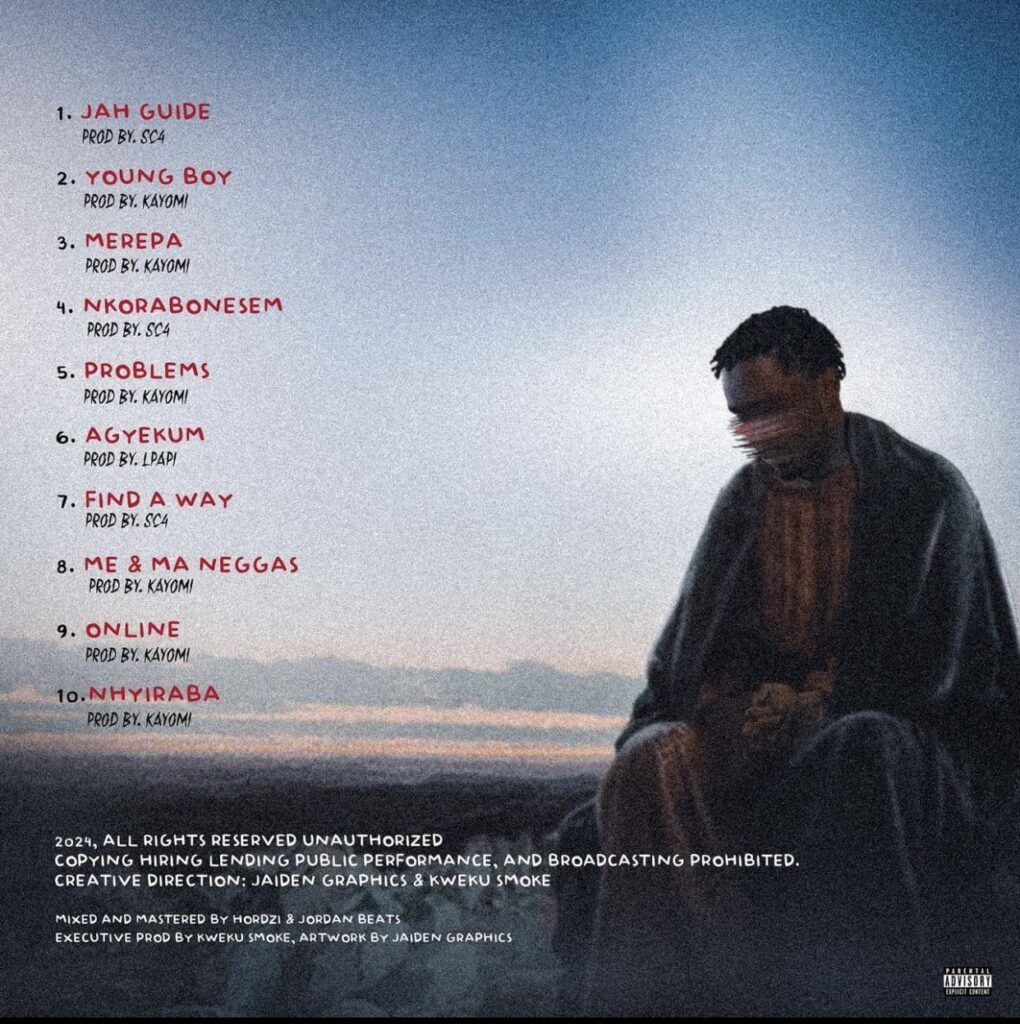
Kweku Smoke is Solidifying His Stake in Hip Hop with ”Kweku Jesus”
On his latest album, Kweku Smoke perfectly combines introspective thoughts with street chronicles.
Any artist who releases three albums and an EP in a one-half year span is either attempting to make a statement, just flexing his prolific tendencies or has a lot to say. The reasons could be all the above and more in the case of rapper Kweku Smoke (Paul Amankwah). He finds himself within the brackets of Ghanaian rappers crafting and releasing cohesive bodies of work on a consistent basis. (Smoke released 2 albums –Playman, He Just Different, and EP- Old Compound in 2023). On 8th March, 2024, he released “Kweku Jesus”, a new album stuffed with personal affirmations and introspective brooding that echoes those of today’s youth. The 10-track hip hop album can be described as wailing echoes over pristine beats.
This observation is clearly demonstrated on “Agyekum”; an introspective narrative of ambition turned sour stemming from societal pressures/expectations, bad company, deception, death, and incarceration. Over sombre production by Ipapi, Kweku Smoke delivered a cautionary tale about a young, timid soul named Agyekum whose desire for success led to his incarceration after murdering a victim for blood money. The opening lyrics of the song “was our sojourn worth it? why did we come here?” was the perfect harbinger to the sad tale that followed. On the first verse, Kweku Smoke spoke on the humble beginnings of his “brother” Agyekum. The second verse- regrets, promise to change for the best-was delivered from the point of view of the now incarcerated Agyekum. Kweku Smoke’s description of prison conditions – overcrowding making it difficult to breathe or sleep well- in just one line was brilliant.
Real life issues that are relatable to many young people, the quest to be successful, disappointments and societal pressures were themes explored on the album. The opening track “Jah Guide” is heralded by solo piano chords backed by a choir before the expectant drums rolled in to suck out that sombre tone. Kweku Smoke glid over couplets of perspectives including the accusatory insinuations of trading his mother’s life for his success, as well as being headstrong about chasing his tailored dreams. “Young Boy” is a cautionary memo to all young boys to “never give up” regardless of the curve ball life throws at you.


The trap beat enhanced songs like “Mmerepa”, “Find A Way”, “Me & Ma Neggars’’ are filled with self- assuring thoughts and hopes for a breakthrough delivered like a preacher sermonizing to his congregants. He used his own circumstances as a mirror of motivation for whoever is listening to never give up. The bounce heavy songs “Problems” (noticed the Bosom P-Yung impression?) and “Nkorabonesm” are a gauge into the mental health of young people including himself and how to survive the streets: “I was raised at home, but the streets turn my soul”, he declared on Nkorabonesm”. The album closes with the soulful “Nhyira”, a song that exalts God for his divine mercies through life’s boundless twists and turns. The song offers “Kweku Jesus” its full cycle moment- a straight line can be draw through “Nhyiraba” and “Jah Guide” in terms of themes.
The charm of “Kweku Jesus” lay in its production offered by Ipapi, SCA, Kayomi who produced one song, 3 songs and 6 songs respectively. The hip hop beats ranged from soulful to up-tempo with alluring basslines. Surprisingly, the album side-stepped the current wave of grating drill beats which he explored on previous albums. Could the album title suggest Kweku Smoke as the ‘’saviour’’ of Ghana hip hop or a survivor on this wretched earth with a message?
Ghana has been the hub of hip hop since the mid-90s when hiplife was commercialized. Though the advent and dominance of Afrobeats in recent years has cast the country among the best to do it, the candle of hip hop continues to radiate through the works of Sarkodie, Kweku Smoke, Black Sherif, The Asakaa Boys, M.Anifest, Kwesi Arthur, Ko-Jo Cue and more.
‘’Kweku Jesus’’ is a well executed project in both lyricism and production. You can tell that he, along with the various producers invested resources in crafting an album with good sonic appeal. His raps are well laid, each bar delivered with clarity and conviction. Each track carried shards of Kweku Smoke’s personal or witnessed experiences. However, songs like “Find A Way” and “Online”, in the view of this writer, comes across as fillers considering their subject matters had been hinted upon on other records.
Kweku Smoke might not be the face of hip hop in Ghana but his almost fanatical pursuit of the artform at this level, across three albums in a year-and-half positions him among the best doing it now-sales or number of streams notwithstanding. The descriptive tone of his street tales might not rival that of Kwaku DMC but his drive, consistency, tenacity, and quest to satisfy the musical thirst of his fans, is without a doubt admirable.

